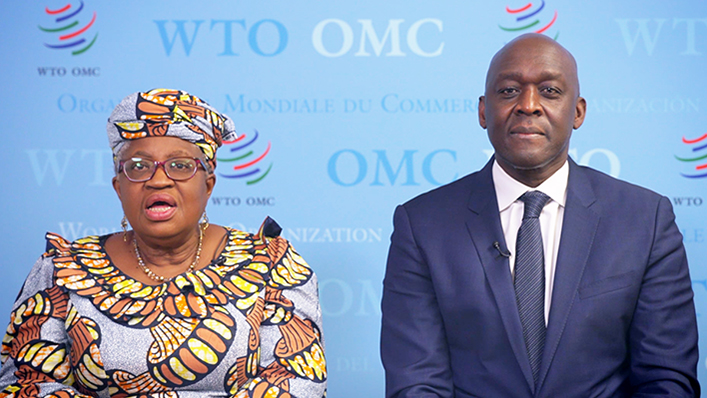
The workshop was attended by small importers and exporters and their representative associations in Rwanda as well as trainers from the WTO, IFC and the Export-Import Bank for Africa. The business representatives were experienced in trading a wide range of products, including horticulture, poultry, maize, leather, cassava flour, tea and coffee.
DG Okonjo-Iweala emphasized the importance of trade finance for boosting trade growth in Africa. “Trade finance is the lifeblood of trade. Access to trade finance is key to a firm’s competitiveness in international markets,” she said.
She pointed out the significant shortfall in financing for small traders in Africa. According to the African Development Bank’s trade finance survey, the continent rejects about USD 80 billion worth of requests for trade finance annually.
DG Okonjo-Iweala outlined the key findings of the WTO-IFC joint study on trade finance gaps in the four largest economies of the Economic Community of West African States (ECOWAS) — Côte d’Ivoire, Ghana, Nigeria and Senegal – issued in 2022. This revealed that if ECOWAS countries raised the share of trade supported by trade finance to the average African level of 40%, they could gain an extra 8% in trade flows annually. In ten years, this would total USD 140 billion in additional trade.
Mr Diop said one of IFC’s top priorities is to enhance small businesses’ access to trade finance through its Global Trade Finance Program. Recently, the program committed a record USD 6 billion in 74 countries, he added.
African countries can only fully benefit from the African Continental Free Trade Area by bridging the trade finance gap on the continent, he said. He highlighted the importance of enhancing the digitalization of trade finance to improve its reach, increase efficiency and transparency, and reduce processing time and cost for transactions.
Both leaders emphasized the importance of the two organizations’ joint efforts in addressing the critical issue of trade finance, especially during such challenging times. “In a fragmented world, trade is what brings us together,” said Mr Diop.
They said the Kigali workshop is playing an important role in addressing the trade finance gap head-on for small traders, especially women-owned businesses. The workshop will improve participants’ awareness of new technologies and banks’ financial requirements for small businesses, they highlighted. “Ultimately, more trade finance means greater trade diversification,” said DG Okonjo-Iweala.
Last year, the WTO and IFC conducted a similar joint training course on trade finance in Cote d’Ivoire.
Share
Reach us to explore global export and import deals